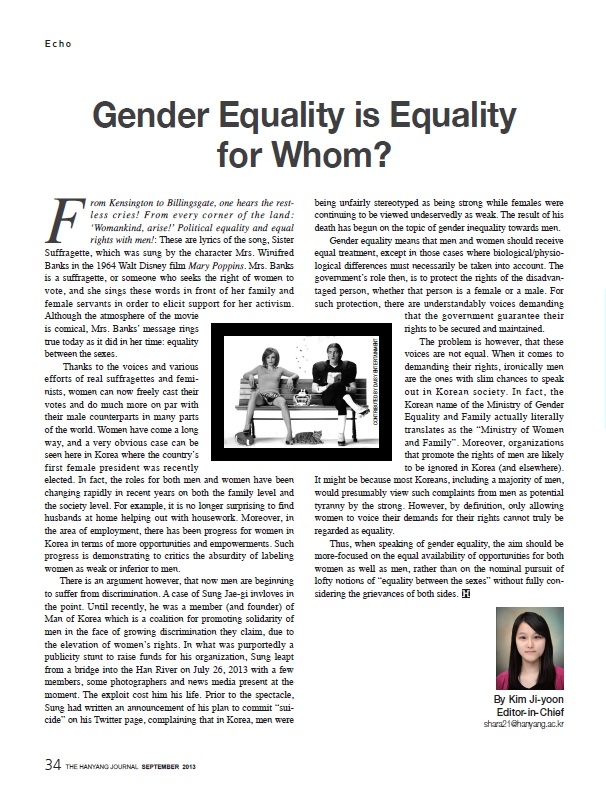
“From Kensington to Billingsgate, one hears the restless cries! From every corner of the land: ‘Womankind, arise!’ Political equality and equal rights with men! ” These are lyrics of the song, Sister Suffragette, which was sung by the character Mrs. Winifred Banks in the 1964 Walt Disney film Mary Poppins. Mrs. Banks is a suffragette, or someone who seeks the right of women to vote, and she sings these words in front of her family and female servants in order to elicit support for her activism. Although the atmosphere of the movie is comical, Mrs. Banks’ message rings true today as it did in her time: equality between the sexes.
Thanks to the voices and various efforts of real suffragettes and feminists, women can now freely cast their votes and do much more on par with their male counterparts in many parts of the world. Women have come a long way, and a very obvious case can be seen here in Korea where the country’s first female president was recently elected. In fact, the roles for both men and women have been changing rapidly in recent years on both the family level and in general society. For example, it is no longer surprising to find husbands at home helping out with housework. Moreover, in the area of employment, there has been progress for women in Korea in terms of more opportunities and empowerment. Such progress is demonstrating to critics the absurdity of labeling women as weak or inferior to men.
There is an argument however, that now men are beginning to suffer from discrimination. A case in point involves the late Sung Jae-gi. Until recently, he was a member (and founder) of Man of Korea which is a coalition promoting solidarity of men in the face of growing discrimination they claim, due to the elevation of women’s rights. In what was purportedly a publicity stunt to raise funds for his organization, Sung leapt from a bridge into the Han River on July 26, 2013 with a few members, and some photographers and news media present. The exploit cost him his life. Prior to the spectacle, Sung had written an announcement of his plan to commit “suicide” on his Twitter page, complaining that in Korea, men were being unfairly stereotyped as being strong while females were continuing to be viewed undeservedly as weak. The result of his death has begun on the topic of gender inequality towards men.
Gender equality means that men and women should receive equal treatment, except in those cases where biological/physiological differences must necessarily be taken into account. The government’s role then, is to protect the rights of the disadvantaged person, whether it is a female or a male. For such protection, there are understandably voices demanding that the government guarantee their rights be secured and maintained.
The problem is however, that these voices are not equal. When it comes to demanding their rights, ironically men are the ones with the weak voices in Korean society. In fact, the Korean name of the Ministry of Gender Equality and Family actually literally translates as the “Ministry of Women and Family”. Moreover, organizations that promote the rights of men are likely to be ignored in Korea (and elsewhere). It might be because most Koreans, including a majority of men, would presumably view such complaints from men as potential tyranny by the strong. But by definition, only allowing women to voice their demands for their rights cannot truly be regarded as equality.
Thus, when speaking of gender equality, the aim should be more on focusing on the equal availability of opportunities for both women as well as men, rather than on the nominal pursuit of lofty notions of “equality between the sexes” without fully considering the grievances of both sides.
이 기사를 공유합니다

